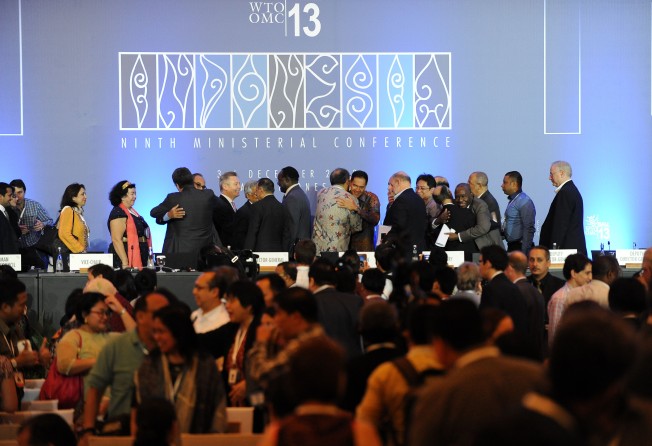To boost business, WTO must ditch 'all or nothing' approach
Two-speed structure would let small groups of members negotiate deals under trade body's structure, with the option of others joining later

The media paid little attention, but last Saturday the World Trade Organisation achieved a breakthrough - of a sort.
For the first time in the WTO's 19-year history its members, all 159 of them, managed to reach an agreement.
After five days, and several nights, of extended negotiations in the Balinese resort of Nusa Dua, the assembled trade ministers finally succeeded in clinching a deal on "trade facilitation".
The details, as one attendee admitted, were "extraordinarily mundane". But the pact, which aims to lower the costs of international trade by cutting red tape and standardising and streamlining customs procedures, should yield significant benefits.
Victor Fung, honorary chairman of Hong Kong supply chain manager Li & Fung, estimates the deal could halve the average cost of shipping merchandise across borders from 10 per cent of the goods' value to just 5 per cent.
As a result, the Washington-based Petersen Institute reckons the new deal could boost trade by enough to create 21 million jobs, half of them in East Asia, and to add US$960 billion to the world's economic output.
That equals 1.3 per cent of last year's global gross domestic product; a gain that is certainly not to be sniffed at.
Even so, Saturday's pact looks like slim pickings for 12 long years of haggling.
After all, facilitation is the least contentious part of trade negotiations, and last week's deal falls far, far short of the comprehensive global trade agreement envisaged at the start of the Doha round of talks back in 2001.
The WTO's glacially slow progress and the meagreness of its results can be blamed largely on its adherence to what is known in the jargon as "the single undertaking".
In plain language, this is the principle under which nothing is agreed unless everything is agreed by everyone.
The idea behind this principle was to raise the stakes in negotiations, tying tough topics to rewarding ones in an attempt to get a deal done.
It backfired. Instead of lending impetus to the talks, it allowed any individual member to hold the whole negotiation process to ransom over matters of little international importance but with great political resonance back home.
In frustration, many of the WTO's leading members are now pursuing separate agreements with their major trading partners outside the organisation's structure. The best known of these is the Trans-Pacific Partnership, which aims to clinch an agreement between the United States, Japan, and a handful of other allied economies (but not China).
Although these agreements might sound like a sensible alternative to dysfunctional WTO negotiations, they suffer from some major drawbacks.
For one thing they are discriminatory, as any agreement which favours the goods of members must automatically disadvantage non-members.
Second, they shift the balance of power disproportionately towards major economies like the US and the European Union, which can devote huge resources to securing advantageous deals, and away from poorer countries.
Third, they add greatly to the complexity of the global trade system. The result is a "noodle bowl" tangle of agreements. Some may even have contradictory regulations, for example on rules of origin, making compliance difficult and adding to the cost of doing cross-border business.
So although bilateral and regional trade deals might generate diplomatic dividends for politicians and fat fees for lawyers, they seldom appeal to actual businesspeople.
According to James Bacchus, former chairman of the WTO's appeal court, the solution is for the organisation to ditch its single undertaking, and instead move to a two-speed structure in which small groups of willing members negotiate agreements within the WTO's structure, to which other members can sign up later.
These "plurilateral" deals already exist. Notably there is the 1996 agreement on government procurement, which now covers 43 WTO members.
The advantages over bilateral and regional deals are considerable. Plurilateral deals are not discriminatory, as any WTO member that wants to join is entitled to do so, provided it is prepared to abide by the agreement's rules.
What's more, they are subject to the WTO's existing procedures for resolving disputes, and are consistent with existing trade rules, which avoids unnecessary duplication and expense.
Some negotiating areas, like agricultural subsidies and carbon pricing, will still have to be negotiated multilaterally among all members.
But the economic rewards from pursuing plurilateral deals on, for example, trade in services or in green technologies, would be enormous. And that way we wouldn't have to wait another 12 years for the next agreement.